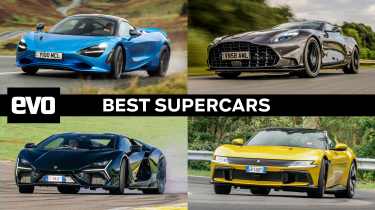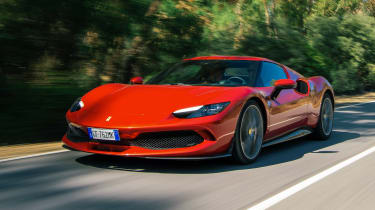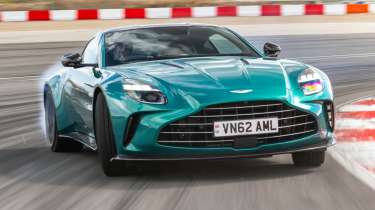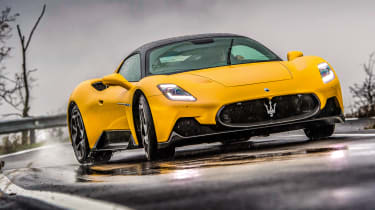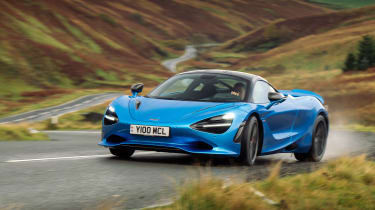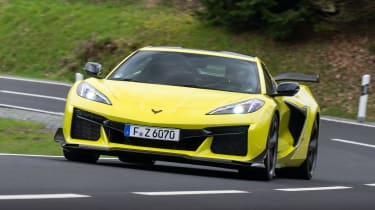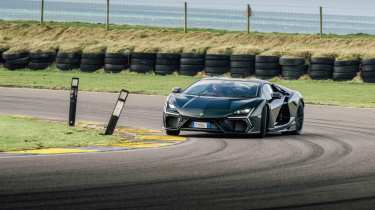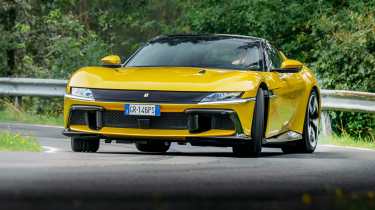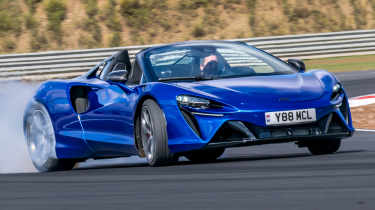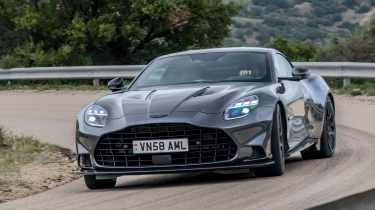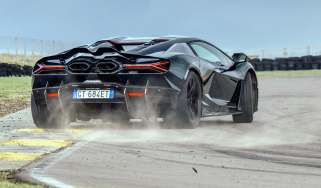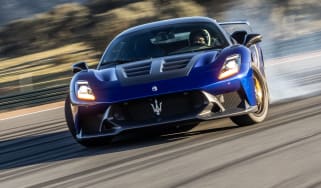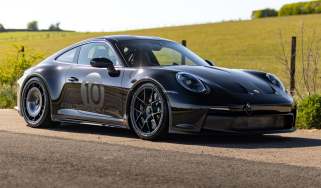Best supercars 2025 – our favourite show-stopping driving machines
Want to go fast and make a statement whilst doing so? These are the best supercars of 2025
The supercar is a staple of the bedroom wall poster; what many of us dream to drive, and one day aspire to own. Yet while we all know what a supercar is, there isn’t really a go-to template for one in 2025 – it can be front, mid- or rear-engined, two or all-wheel drive and powered by either petrol, batteries or both. But what all supercars must do is deliver an unforgettable driving experience, with some theatricality thrown in for good measure.
Some of today’s supercars operate at the leading edge of technology, while others hone the traditional formula to the highest level – think McLaren Artura (hybridised, turbocharged, ‘the future’ as some might say) and Aston Martin Vantage (front-engine, rear-drive and a bit old-fashioned in that respect). Then there's Lamborghini's latest flagship, the hybrid-powered Revuelto, which combines new-age tech with old-school V12 charm.
The good news is that despite less than favourable conditions putting pressure on these types of cars, there are more and more offerings joining the party, from front-engined GT-flavoured V12s like the Ferrari 12 Cilindri and Aston Martin Vanquish to high-revving hybrid screamers like Lamborghini’s Temerario. The supercar landscape’s constantly evolving, but right now things are looking good; these are our picks of the current crop.
Top ten supercars 2025
- Ferrari 296 GTB
- Aston Martin Vantage
- Maserati MC20
- Porsche 911 GT3 RS
- McLaren 750S
- Chevrolet Corvette Z06
- Lamborghini Revuelto
- Ferrari 12 Cilindri
- McLaren Artura
- Aston Martin Vanquish
Ferrari 296 GTB
Ferrari’s electrified generation is accelerating quickly, and after the flawed but fast SF90 comes this second hybrid supercar, the 296 GTB. This Ferrari is the first to feature a V6 engine (officially), and while it may sound like a fuel-saving exercise in conjunction with its new hybrid system, the V6 is the most powerful factory six-cylinder in the world, creating a combined total of 819bhp – a huge jump over previous mid-engined Ferraris at this price point.
The best bit is not the performance, or the numbers, but how brilliant the 296 GTB is to drive. Despite power coming from different sources, it’s superbly calibrated and impressively natural, with a playful edge that uses the on-board stability, traction and slip control systems to make the car feel even more agile than you’d imagine.
Is there a catch? Well, Ferrari’s advancements in hybrid technology have moved a tad faster than its user interfaces. While the car is practically perfect to drive, the interior is a frustrating melange of latent screens and messy menus. But who cares when the 296 GTB looks, drives and even sounds as good as it does. It might have started with a wobble, but Ferrari has proven the age of the hybrid supercar is nothing to be concerned about.
Aston Martin Vantage
Traditionally, the Aston Martin Vantage has straddled the line between sports car and supercar, but the latest iteration has moved much closer towards the latter category. It’s been designed in accordance with Aston’s repositioning as a maker of sharper, more explosive and more technologically advanced performance cars, and the results are…intense.
With 656bhp, the Vantage’s 4-litre twin-turbocharged V8 generates a massive 153bhp more than the car it replaces, and the chassis has been comprehensively reworked to deliver faster reactions and more precision. These changes proved popular with our testers on eCoty 2024 with the editor making it his outright winner while two other judges had it in a podium position.
Despite the colossal power levels there’s a natural feel to the way the Vantage drives – the suspension is firm but the controls are intuitive, allowing you to lean on its available grip and the plethora of electronics Aston has deployed for the new model, variable traction control among them. It’s a superbly balanced car with thunderous performance, one that feels like a true Aston to its core.
Maserati MC20
It’s been a while since Maserati’s had a car worthy of a spot on this list, yet from the brand’s latest ‘rebirth’ has arrived the MC20 – a superb supercar that appeals not because of its glamour or tech, but for the simple and pure driving experience it delivers. In fact, it's so good, we crowned it the evo Car of the Year 2022.
Underpinning the MC20 is a carbon tub chassis that’s built down the road from Maserati’s factory in Modena by Dallara. From this basis sits a twin-turbocharged V6 of Maserati’s own design, incorporating the first road-car application of Formula 1-derived pre-combustion chamber technology. This, plus two turbochargers, gives the MC20 all the power it needs, with no less than 621bhp.
But the beauty of the MC20 isn’t just its engine, but the way Maserati has set the car up. It’s aggressive, sharp and agile, but has a definite whiff of Alpine A110 to the way its suspension allows it to glide over rough road surfaces with more delicacy and composure than you might expect. As a driving experience it’s both immensely satisfying and distinct from most rivals.
Porsche 911 GT3 RS
Ignore for a moment that Porsche emphatically calls its 911 a sports car and not a supercar, because there is no doubt that the current GT3 RS is one of the most desirable cars on sale right now. This isn’t because Porsche has turned it into a poser’s car, but because it's the most extreme iteration of a road-going 911 yet.
The new GT3 RS is a firm-riding, loud, intense experience, with steering that’s so quick and precise that a sneeze on the motorway will have you crossing three lanes. It’s also loud inside – not from its exhaust noise (although this is all-consuming at the 9000rpm redline), but the road noise its massive rear tyres generate on anything other than freshly surfaced tarmac.
To drive, though, the RS is one of few road cars that feels capable of battling for a class win at the Spa 24 Hours. The numbers might look a little meek in this company with ‘just’ 518bhp, but in terms of raw performance and lap time, the RS is almost unbeatable. Even if you have an extreme track toy like a Radical SR3 XXR or Ariel Atom 4R, neither of which could match the Porsche at our 2024 Track Car of the Year test…
McLaren 750S
In amongst the transition to electrification and hybrid supercars, the 750S is a refreshing hit of unadulterated turbocharged fury. The ingredients are familiar to those of the 720S that came before (and won eCoty in 2017), but there isn't a better starting point to build an exciting, usable supercar.
The 4-litre twin-turbo V8 now generates 740bhp, and the gearbox now has shorter ratios for an even more intense delivery. It's still a featherweight in a modern context too, weighing 1389kg, and McLaren has fine-tuned the suspension and steering to offer shades of the ultra-hardcore 765LT.
The results are astonishing. The performance is even more eye-opening than before, with an insatiable appetite for revs at the top end. The rear tyres spin up over bumps and yet there's a calmness to the steering and the ride that defines all McLarens. It's an amazing blend of precision and savagery.
Chevrolet Corvette Z06
By switching to a mid-mounted V8 for the latest C8 Corvette, Chevrolet has created the perfect basis to tackle the supercar establishment head on. The track-focused Z06 version is by no means the first hardcore Corvette, but it is the first available in right-hand drive; better still, it's the most visceral, engaging model yet.
Chevrolet's engineering team makes no secret of its inspiration for the harder, sharper Z06. The newcomer's 5.5-litre flat-plane crank V8 marks a significant change in character over the standard car and recalls the response, noise and drama of the Ferrari 458's naturally-aspirated motor, rather than the rumbling big-chested nature of traditional American performance cars.
With an 8600rpm redline and 661bhp sent to the rear wheels alone, the Z06 adopts wider tracks, stiffer springs and comprehensive aero modifications to contain its raised power output and provide extra bite. The result is a thrilling, massively potent supercar that’s quite unlike any Corvette we’ve driven before.
> Chevrolet Corvette Z06 review
Lamborghini Revuelto
There are few better ways to make a statement than a V12 Lamborghini. The Revuelto is the latest, and while it looks even more dramatic than the Aventador that came before, Lamborghini has refined the recipe to the core to conjure a scintillating supercar that feels like a significant step on from its predecessor.
The spec sheet is tantalising. Mounted in the middle of the carbonfibre chassis is a new naturally aspirated 6.5-litre V12, which in combination with three electric motors generates 1001bhp. The engine is mated to an eight-speed dual-clutch gearbox mounted transversely behind it – the battery is in front where the gearbox was on the Aventador – and is a world away from the Aventador's slurring, jerky single-clutch ISR unit in terms of smoothness and shift speed.
Despite weighing 1772kg (dry), the Revuelto has sparkling response and enormous ability on a track. Where the Ferrari SF90 feels hyper alert and vibrant, the Lambo is more measured and natural to drive, with electric motors at the front axle providing torque vectoring to hook cleanly into and out of corners. The Revuelto combines traditional Lamborghini traits with supreme dynamic class, making for a truly great modern supercar.
Ferrari 12 Cilindri
There will come a time when the naturally aspirated V12 Ferrari dies a death but that time hasn’t arrived quite yet, and the 12 Cilindri is a celebration of that most fabulous confection, a V12 Ferrari supercar. The 6.5-litre engine does without turbos or hybrid assistance and develops a glorious 819bhp at a heady 9250rpm. It’s been strangled a little bit by noise regulations but still sounds sensational, if a tad muted at times.
There are plenty of nods to the past in its design – the Daytona-esque front end for example – and in the flesh, the 12 Cilindri looks every bit the supercar. There’s a strong GT-vibe to the car with a supple ride, refined eight-speed transmission and a well-appointed cockpit.
There’s far more to it than that though as the 12 Cilindri has poise and agility running through it with quick-witted steering and levels of grip that are quite astonishing in the dry. In the wet it’s controllable and far less intimidating than you might be expecting from and 819bhp rear-drive machine. Available as both a coupe and a spider the 12 Cilindri is a remarkable achievement.
McLaren Artura
The first of McLaren’s series-production plug-in hybrids has arrived. Fundamentally, the Artura retains the ideological centre points of McLaren Automotive, running a carbon tub chassis with four corners of double wishbone suspension, a mid-engined twin-turbo engine and dual-clutch transmission. But the Artura’s brought a few new toys to the playground that should give it the distinction McLaren’s range so badly needs.
The first of which is a hybrid powertrain module, giving the Artura an all-electric mode as well as a useful performance boost. It’s paired with a new engine, a Ricardo-built 3-litre V6, that produces a total power figure of 690bhp and 531lb ft of torque. It’ll hit 62mph in 3sec and carry on to 205mph; big numbers for a supercar that carries on from junior Sports Series models.
What’s the result of all this change in the real world? It feels new. The trademark elements that define modern McLarens, such as hydraulically-assisted steering and a superb driving position, have been retained, but there’s a new level of sophistication and complexity that buffs off the edges. No, it doesn’t quite have the inherent sharpness of the 600LT, or the simply outrageous performance of Ferrari’s 296 GTB, but as a launchpad for McLaren’s new generation, it’s very promising indeed.
The good news for open top fans is that the Artura is also available as a Spider. There are no structural rigidity losses for the Spider when compared to the hard top so it’s as dynamically thrilling, too. It can get a little blowy in the cockpit when the roof has been electrically lowered, but the upside is that you can hear that V6 better. The Artura Spider came joint second in eCoty 2024 which demonstrates how highly we rate it.
> McLaren Artura Spider review
Aston Martin Vanquish
In the words of John Barker, the Vanquish is ‘The best Aston of the lats 25 years.’ Praise indeed given some of the excellent machinery that’s come out of Gaydon in that time. Conventional wisdom is that adding turbos strangles and engine’s vocal cords but nobody told this to Aston and the Vanquish’s 824bhp 5.2-litre V12 sounds sensational as well as delivering a 0-62mph time of 3.3sec and a top speed of 211mph. Remarkably similar stats to a certain V12 Ferrari.
Like the 12 Cilindri the Aston nails the GT brief as well as delivering so much more. It’s supple and refined in GT mode with the double wishbone front end and multi-link set up at the rear ironing out the worst road imperfections but select Sport or Sport+ and it really comes alive. Throttle response is even sharper, it’s pace is monumental and the steering is nicely weighted allowing you to precisely position the car despite the Vanquish’s weight and girth.
Inside it’s as you’d expect with swathes of leather, comfortable seats and an excellent sound system. The only drawback is a less than perfect HMI set up and not a huge amount of interior space given the car’s footprint. All this can easily be forgiven when the V12’s strutting its stuff, ranging from bombastic and guttural before rising to a glorious howl.
> Aston Martin Vanquish review

